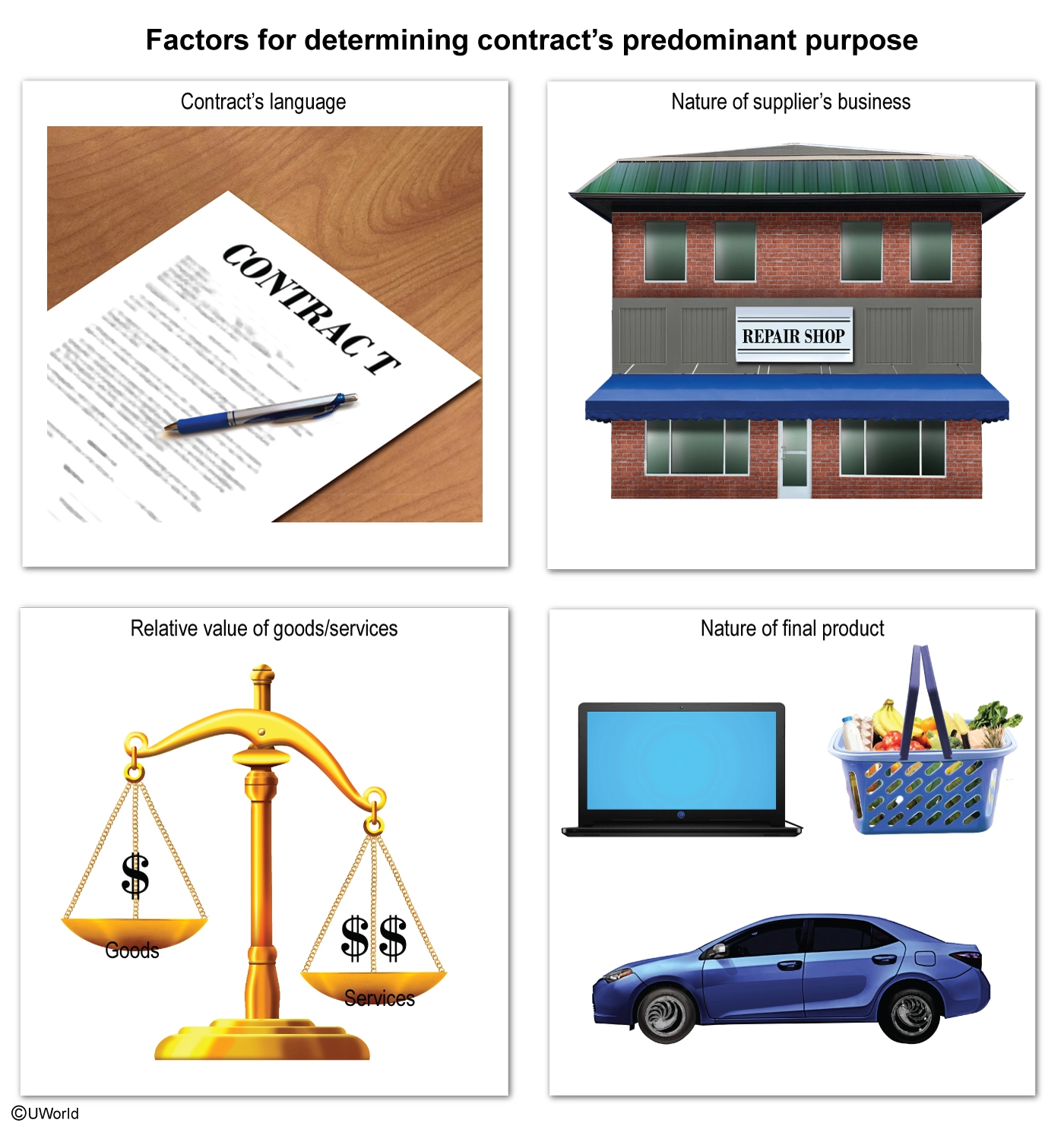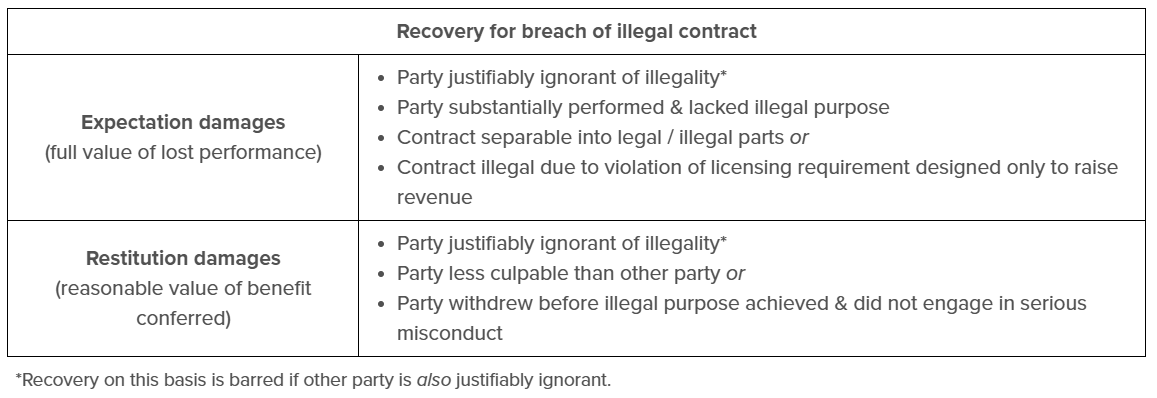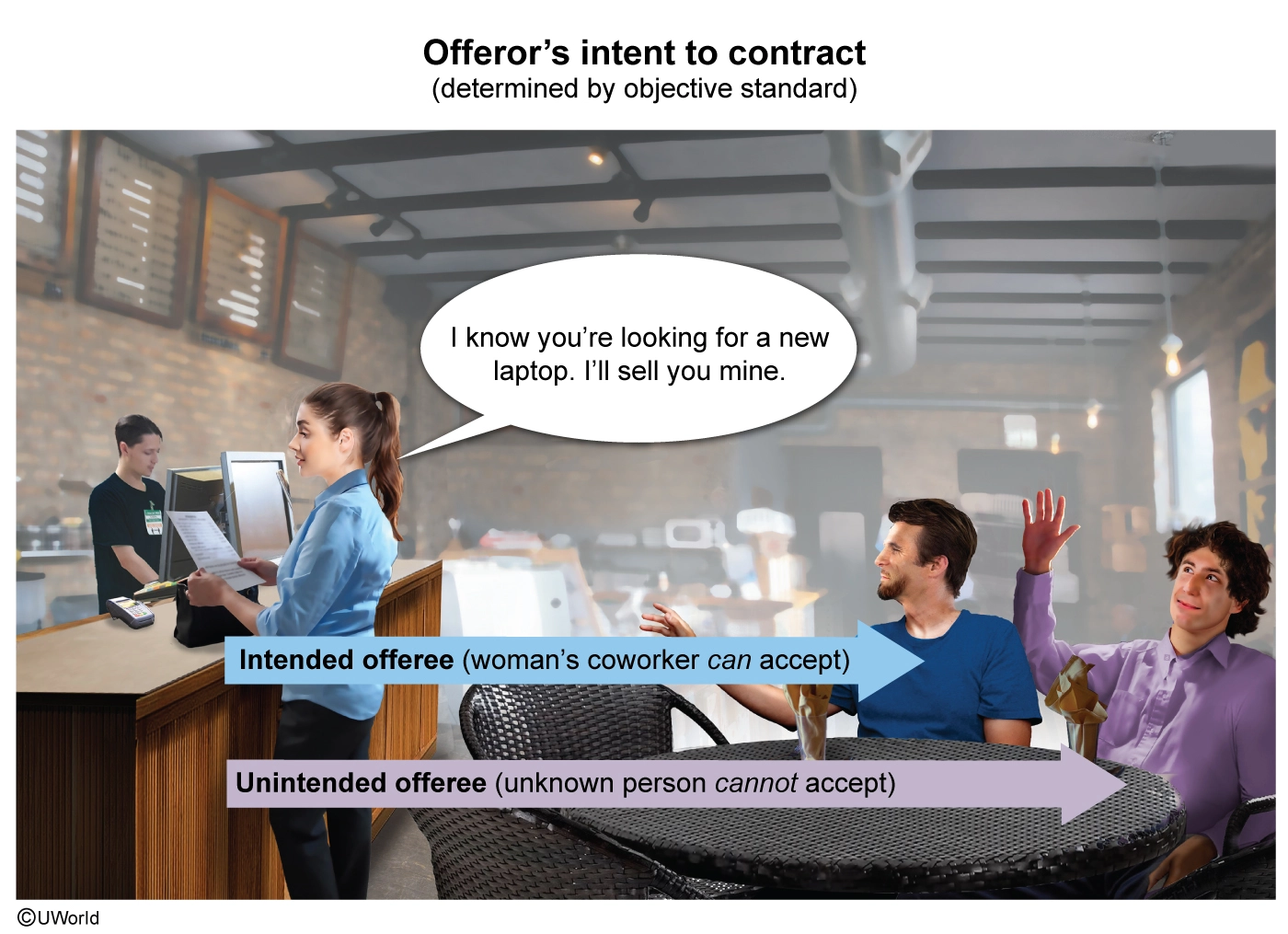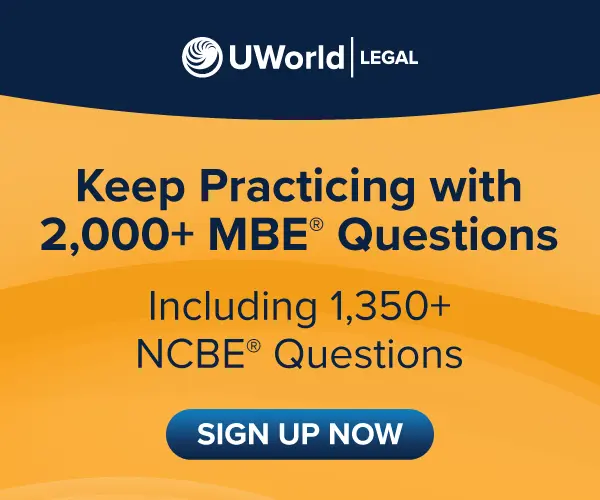A contract is a legal document that protects all parties involved in a legally binding agreement. The National Conference of Bar Examiners (NCBE®) has added contracts as a necessary component of the MBE. Of the 175 scored multiple-choice questions on the bar, you can anticipate about 25 of those questions to be on contracts.1
Contracts Topics
To prepare for the contracts section of the bar exam, it's important to know how it’s organized, which topics are covered, and how they are weighted. The NCBE has based the majority of the questions on common law, while the remaining 25% focus on Articles 1 and 2 of the Uniform Commercial Code (UCC).2
When approaching any contract question on the MBE, determine whether to apply common law or the UCC, which is for the sale of goods.
Questions are divided into 6 categories, with some topics tested more heavily than others.3 For example, 50% of the questions will fall under either Formation of Contracts or Performance, Breach, and Discharge, with each having 6-7 questions. The remaining 50% of the questions will deal with the other 4 categories: Defenses to Enforceability, Contract Content and Meaning, Remedies, and Third-Party Rights, each with 3-4 questions.
| Contracts Topics | % Tested | Questions |
|---|---|---|
| Formation of Contracts | 25% | 6-7 |
| Performance, Breach, and Discharge | 25% | 6-7 |
| Defenses to Enforceability | 12.5% | 3-4 |
| Contract Content and Meaning | 12.5% | 3-4 |
| Remedies | 12.5% | 3-4 |
| Third-Party Rights | 12.5% | 3-4 |
*Source3
Formation of Contracts
About 6-7 questions on the MBE will be on the formation of contracts. Under common law, an acceptance must be the "mirror image" of the offer, or it will be considered rejected. The UCC follows the "battle of the forms," in which an acceptance containing different terms is still regarded as enforceable.
It’s important to determine exactly when a contract was formed. Often, the NCBE will present a series of interactions between 2 parties, and it is up to you to order and classify them correctly (i.e., offer, acceptance, consideration) to determine whether there was mutual consent and, as a result, a valid contract.
Performance, Breach, and Discharge
Another 6-7 questions on the MBE will address performance, breach, and discharge of contracts. Under common law, you must decide whether there was a breach or whether the performance was substantial enough for the other party to be obligated to perform their duty. Under the UCC, the seller must provide a perfect tender of goods for one-shot deals, or the buyer can reject them (although the seller usually has time to correct the mistake).3 Other topics within this category include installment contracts, express conditions, warranties, impossibility/impracticability, and frustration of purpose.
Defenses to Enforceability
You will find 3-4 questions pertaining to defenses to enforceability on the MBE contracts exam. In some cases — such as when at least 1 party is a minor or incapacitated, there is a mutual misunderstanding, or there was deliberate fraud — it is easy to spot when a contract is not enforceable. Other times, the scenario is less obvious, so you should consider whether it falls within the Statute of Frauds.
The Statute of Frauds covers the common law contracts for the sale of land, marriage, agreements involving goods worth more than $500, and contracts lasting 1 year or more. Additionally, it covers UCC contract issues regarding the merchant exception and the maximum quantity of goods to be received. These instances require that the contract be in writing, contain the material terms, and be signed by the "party to be charged."4
Contract Content and Meaning
There will be 3-4 questions about contract content and meaning on the MBE. In these cases, you should decide whether the parol evidence rule applies to the scenario. For instance, if a party tries to add an additional term from the preliminary and/or oral negotiations to the final agreement, it is only allowed if there is partial integration of the contract. So watch out for that merger clause that says, "This is the full and final agreement." Also, note that parol evidence does not apply to additions such as formation defenses, interpretations, conditions precedent, clerical errors, or later modifications.
Remedies
You can expect 3-4 questions about contract remedies, but you most likely know them better as damages. Generally speaking, the nonbreaching party will at least be entitled to expectation damages equal to the value of their position had there not been a breach.5
Therefore, the general formula to calculate damages is as follows: the loss of value of the breaching party's performance + incidental costs + consequential costs – any expenses saved as a result of the breach.6
It's essential to familiarize yourself with all the types of breaches and damages available to a party, such as reliance, restitution, rescission, specific performance, reformation, or remedial rights. When it comes to UCC contracts, which have various damage formulas, the key is ensuring that the non-breaching party ends up with the value they bargained for.
Third-Party Rights
There will be 3-4 questions regarding third-party rights on the MBE. Generally, this means deciding whether a third party has the right to sue on a contract and against whom. The key is correctly identifying the type of situation (i.e., beneficiary, delegation, or assignment).
For example, a common assignment situation would be where Person A owes money to Person B, but Person B assigns the right to receive the money to Person C. In that situation, if Person C does not receive the money, the question may ask whether they can sue and, if so, against whom. Another common scenario is hiring a subcontractor whereby Person A hires Person B to perform a service, but then Person B delegates it to Person C, who doesn't perform. In this case, it's important to remember that delegation is generally permissible even without consent, writing, or consideration when determining whether Person A can sue and, if so, against whom.7
California’s Transition to New Multiple-Choice Questions
Beginning in February 2025, the California Bar Exam will introduce multiple-choice questions developed by Kaplan. These questions will replace the NCBE’s traditional MBE questions, aligning with the State Bar’s goal of modernizing exam delivery. The new multiple-choice section will continue to assess fundamental legal principles and reasoning across 7 tested subjects, including contracts. It will consist of 200 questions administered over four 90-minute sessions.8 This updated format allows for remote and in-person test options, ensuring flexibility while maintaining the rigor and integrity of the bar exam.
How to Study for Contracts on the MBE
Here are some practical strategies for breaking down common contract-related questions.
Identify the Main Purpose
Determine whether the scenario falls under common law or the UCC. While this distinction is usually clear, it can get tricky with mixed-purpose contracts, such as catering agreements that involve goods and services. In these cases, ask yourself, “What is the main purpose of the contract?” For instance, if a caterer’s primary role is to serve food at an event, the contract likely governs services. However, if the caterer’s role is limited to delivering the food, it would generally be classified as a goods contract under the UCC.
Remember the Mailbox Rule
Imagine this scenario: You send a rejection letter to an offer but later change your mind and send an acceptance letter. Do you have a contract? According to the Mailbox Rule, which governs the acceptance and rejection of communications sent by mail or email, it depends. This rule applies to contracts under the common law and the UCC.
The Mailbox Rule, also known as the Posting Rule, states that a contract is formed the moment an acceptance is sent.9 Even if the rejection is sent after the acceptance but is received first, the acceptance still creates a binding contract — unless there was detrimental reliance. Conversely, a rejection only becomes effective upon receipt. If a rejection is sent first and then an acceptance, the outcome hinges on which communication the offeror receives first.
Remember Special UCC Rules
Under common law, an acceptance must comply with the mirror image rule, meaning any modification to the terms is treated as a rejection and counteroffer. However, Article 2 of the UCC introduces special rules for contract disputes, particularly for transactions involving goods. For instance, when both parties are merchants, conflicting terms in their communications cancel each other out, and the remaining provisions are used to resolve any discrepancies — unless the offer explicitly states otherwise or is revoked within a reasonable time. When at least 1 party is not a merchant, any additional terms are treated as mere proposals and are not binding.
The UCC also broadens the definition of a "merchant" when applying the firm-offer rule. In this context, a merchant includes any businessperson engaged in a commercial transaction.10 Under this rule, an offer made in writing by a merchant cannot be revoked, even without consideration from the offeree, provided the offer is signed and indicates it will remain open.
Tips on Damages for Breach of Contract
In cases of a breach of contract, the default remedy is damages to compensate the nonbreaching party. The type and amount of damages depend on the specific circumstances of the case. Most often, damages are calculated based on the nonbreaching party’s expectation interests — the value they would have received if the breach had not occurred — along with any consequential or incidental losses caused by the breach.11
If expectation damages cannot be precisely determined, fallback remedies such as reliance damages, which reimburse expenses incurred in reliance on the contract, or restitution damages, which restore any benefit conferred on the breaching party, may apply. In some cases, liquidated damages, agreed upon in advance within the contract, may also be awarded to return the nonbreaching party to their precontract position.
Tips on Remedies When There is No Contract
When no enforceable contract exists, remedies may still be available to compensate the plaintiff. The first step is determining whether the defendant made a promise. If a promise was made and the plaintiff relied on it to their detriment, promissory estoppel allows the plaintiff to recover reliance damages, restoring them to their original position.
If no promise was made but the defendant knowingly accepted a benefit while the plaintiff expected payment, the principle of quasi-contract may apply. In such cases, the plaintiff can recover restitution damages equal to the fair market value of the benefit conferred.
Know About Highly Tested Issues
Beyond the main topics, several frequently tested issues should not be overlooked when preparing for contracts questions on the MBE. It’s important to understand the distinctions between unilateral and bilateral contracts, as well as when to apply the knock-out rule versus the mirror image rule. Additionally, review the steps for creating and terminating an offer and the rules for revoking goods.
While the majority of MBE contract questions are rooted in common law, you should not neglect UCC principles. Expect 6-7 questions focused on UCC Article 2, revised Article 1, and the key differences between UCC provisions and common law rules.
Practice
The contracts section of the MBE is designed to test even the most prepared students by including pitfalls and trick questions. Even if you excelled in your law school contracts course, this section requires a strategic approach to ensure success. The best way to prepare is to do as many practice questions as possible, particularly those released by the NCBE. These questions provide insight into common patterns and help you recognize areas where mistakes often occur. Consistent, focused practice will refine your ability to navigate the complexities of contracts questions on exam day.
Contracts Law Sample Questions and Answers
Below are a few sample contract questions from UWorld, paired with detailed answer explanations to strengthen your understanding of the material:
The owner of a new office building contracted with a well-known landscaper to design and install landscaping around the building for $30,000. The agreement was memorialized in writing, was signed by both parties, and called for a budget of $5,000 for trees, shrubs, sod, and materials. The contract required the landscaper to complete the work within six months. Due to an unexpected increase in the price of trees and shrubs, the landscaper abandoned the project and never completed any of the work.
Three years after the landscaper's deadline, the building owner sued the landscaper for breach of contract. In the jurisdiction, the statute of limitations for breach of a services contract is two years after the breach, and the statute of limitations for breach of a sale-of-goods contract is four years.
Can the owner recover damages from the landscaper?
| A. | No, because the contract is divisible with respect to the services and goods, and the landscaper's breach is therefore subject to the two-year statute of limitations. | |
| B. | No, because the contract primarily calls for services, and the landscaper's breach is therefore subject to the two-year statute of limitations. | |
| C. | Yes, because the landscaper's breach was a result of an increase in the price of goods, and his breach is therefore subject to the four-year statute of limitations. | |
| D. | Yes, because the landscaper's breach was willful, and he is therefore estopped from denying that his breach is subject to the four-year statute of limitations. |
Contracts for the sale of goods are governed by Article 2 of the Uniform Commercial Code (UCC), while contracts for services are governed by common law. However, some contracts involve the sale of goods and the rendering of services. To determine which law applies to a "mixed" or "hybrid" contract, courts ask whether its predominant purpose was the sale of goods or the rendering of services. The following factors are relevant to this determination:
- The contract's language
- The nature of the supplier's business (ie, whether it typically provides goods or services)
- The relative value of the goods and services
- The nature of the final product (ie, whether it can be described as a good or service)
Here, the building owner contracted to buy goods (eg, trees, shrubs, sod) and services (ie, designing and installing the landscaping). The owner likely hired the well-known landscaper due to his skill in performing landscaping services, and the $5,000 budget for goods was just one-sixth of the $30,000 contract price. Therefore, the contract primarily calls for services and is subject to the jurisdiction's two-year statute of limitations. And since the owner sued three years after the breach, the owner cannot recover damages from the landscaper.
(Choice A) The predominant-purpose test is unnecessary when a contract is divisible—ie, when the payment for goods can easily be separated from the payment for services. But here, the contract is likely indivisible since it combined the sale of the trees, shrubs, and sod with their installation.
(Choices C & D) The predominant-purpose test focuses on the parties' reason for entering the contract—not for breaching it. Therefore, it is irrelevant that the landscaper's breach was (1) a result of an increase in the price of goods or (2) willful.
Educational objective:
Sale-of-goods contracts are governed by the UCC, while services contracts are governed by common law. When a contract calls for the sale of goods AND the rendering of services, the contract's primary purpose determines whether the UCC or common law applies.
- Bonebrake v. Cox, 499 F.2d 951, 960 (8th Cir. 1974) (applying the predominant-purpose test to determine which statute of limitations applies to a mixed contract for goods and services).
- Princess Cruises, Inc. v. Gen. Elec. Co., 143 F.3d 828, 833 (4th Cir. 1998) (listing factors that courts consider when applying the predominant-purpose test).
The owner of a gun store had been doing business with a hunter for many years. The hunter entered the gun store and spoke to the owner about purchasing a new hunting rifle on credit. The hunter disclosed that he intended to use the rifle on a turkey-hunting trip that weekend even though it was two weeks before turkey-hunting season began. The hunter left with the rifle after signing a written agreement to pay for the rifle in 12 monthly installments.
The rifle functioned well on the hunter's trip, during which a friend advised the hunter that he could avoid paying for the rifle because the contract was illegal. The hunter took the friend's advice and never paid any installments.
If the store owner sues for breach of contract, will he be likely to prevail?
| A. | No, because the store owner failed to disaffirm the contract's illegal purpose before giving the hunter possession of the rifle. | |
| B. | No, because the store owner knew that the hunter intended to use the rifle for an illegal purpose. | |
| C. | Yes, because a contract to sell a rifle is not, in and of itself, illegal. | |
| D. | Yes, because the store owner substantially performed and did not sell the rifle in order to further the hunter's illegal purpose. |
An illegal contract arises when one or both parties' purpose, formation, or performance is against the law. These contracts are usually void, and there is no recovery for breach. However, an exception arises if one party lacked an illegal purpose and substantially performed under the contract. That party may recover expectation damages for breach—even if he/she knew of the other party's illegal purpose.* This is true unless:
- the performing party took action to further the other party's illegal purpose or
- the illegal purpose involves grave social harm (eg, threat to human life).
Here, the contract was illegal because the hunter's purpose was to use the rifle to hunt outside the mandated turkey-hunting season. However, the store owner substantially performed by giving the hunter the rifle and had no illegal purpose of his own. And though the store owner knew of the hunter's illegal purpose, the store owner took no action to further it (Choice B). Additionally, hunting two weeks out of season does not involve grave social harm. Therefore, the store owner will likely prevail in a breach-of-contract suit.
*If the performing party was unaware of the other party's illegal purpose, then no further analysis is necessary.
(Choice A) The store owner did not need to disaffirm the contract's illegal purpose—eg, by telling the hunter not to use the rifle on the upcoming hunting trip. It is enough that the store owner did not act to further the hunter's illegal purpose and there was no threat of grave social harm.
(Choice C) A contract to sell a rifle is not, in and of itself, illegal (absent statutory restrictions—not seen here). But the contract is still illegal because the hunter intended to use the rifle for an illegal purpose.
Educational objective:
Illegal contracts are usually void and there is no recovery for breach. However, a party who substantially performed and lacked an illegal purpose may recover—even if he/she knew of the other party's illegal purpose—unless (1) the performing party took action to further that illegal purpose or (2) the purpose involves grave social harm.
- Restatement (Second) of Contracts § 182 (Am. Law Inst. 1981) (explaining the effect of performance under a contract when the other party's purpose is illegal).
A woman encountered her coworker and the coworker's friend at a local coffee shop. The woman, who knew that the coworker needed a new laptop for his personal use, had planned to offer her extra laptop to the coworker. The woman went to the counter to place her coffee order and, with her back to the table where the coworker and his friend sat, said, "By the way, I know you are looking for a new laptop. I will sell you my laptop for $100." The friend immediately replied, "I accept your offer!"
Has a contract been formed between the friend and the woman?
| A. | No, because the friend was mistaken as to the terms of the contract. | |
| B. | No, because the friend was not the party with whom the woman intended to contract. | |
| C. | Yes, because the friend reasonably believed that he had the power to accept the woman's offer. | |
| D. | Yes, because the woman's objective intent was to contract with whoever overheard the offer. |
The offeror is master of the offer. This means, among other things, that the power to accept an offer belongs only to the person (or class of persons) with whom the offeror intended to contract. In contract law, intent is measured by an objective standard, not by the subjective intent or belief of a party. Therefore, whether the offeror intended to contract with someone is judged by outward objective facts, as they would be interpreted by a reasonable person.
Here, the woman knew that her coworker needed a new laptop. Her statement—"I know you are looking for a new laptop"—demonstrated her objective intent to contract with the coworker (Choice D). Although the friend overheard the woman's offer to sell her laptop, he could not reasonably believe that he had the power to accept it. This is especially true since there is no indication that the two had ever met (Choice C). Therefore, no contract was formed because the friend was not the party with whom the woman intended to contract.
(Choice A) A mistake as to a basic assumption upon which a contract was made renders the contract voidable—not void. If a contract is voidable, then it is considered valid until set aside. But here, no contract was ever formed because the offer was not accepted by the intended offeree, so this defense is inapplicable.
Educational objective:
The power of acceptance belongs only to the person(s) with whom the offeror intended to contract. Such intent is judged by outward objective facts, as interpreted by a reasonable person.
- Restatement (Second) of Contracts § 29 (Am. Law Inst. 1981) (to whom an offer is addressed).
Frequently Asked Questions
How many Contract questions are on the MBE?
The MBE includes 25 questions on contracts.2
What are the 6 Contracts topics covered on the MBE?
The 6 types of contract topics tested on the MBE are formation of contracts, performance, breach and discharge, defenses to enforceability, contract content and meaning, contract remedies, and third-party rights.
How do you answer contract questions?
When answering contracts questions, start by determining whether the scenario falls under the UCC (for the sale of goods) or common law (for all other contracts). Next, identify the main purpose of the contract, its formation date, and the key terms. These steps will help guide your analysis and ensure you apply the correct legal framework.
Are contracts on the Multistate Essay Exam (MEE®)?
Contracts is not guaranteed to appear, but it remains a potential topic for the MEE.
What are the most-tested topics in contracts?
The most heavily tested topics are:
- 75% focus on common law principles.
- 25% cover contract formation.
- 25% address performance, breach, and discharge.
- 25% concentrate on UCC Article 2 and revised Article 1.
Other MBE Subjects
References
- National Conference of Bar Examiners. (n.d.). MBE. Retrieved from
https://www.ncbex.org/exams/mbe - National Conference of Bar Examiners. (n.d.). Preparing for the MBE. Retrieved from
https://www.ncbex.org/exams/mbe/preparing-mbe - National Conference of Bar Examiners. (2023). MBE subject matter outline. Retrieved from
https://www.ncbex.org/sites/default/files/2023-01/MBE_Subject_Matter_Outline.pdf - Legal Information Institute. (n.d.). Statute of frauds. Cornell Law School. Retrieved from
https://www.law.cornell.edu/wex/statute_of_frauds - Legal Information Institute. (n.d.). Expectation damages. Cornell Law School. Retrieved from
https://www.law.cornell.edu/wex/expectation_damages - LegalMatch. (n.d.). Incidental damages. Retrieved from
https://www.legalmatch.com/law-library/article/incidental-damages-lawyer.html - Legal Information Institute. (n.d.). UCC § 2-210: Delegation of performance; assignment of rights. Cornell Law School. Retrieved from
https://www.law.cornell.edu/ucc/2/2-210 - State Bar of California. (n.d.). Notice to 2025 bar exam takers. Retrieved from
https://www.calbar.ca.gov/Admissions/Examinations/California-Bar-Examination/Notice-to-2025-Bar-Exam-Takers#:~:text=Approved%20that%20beginning%20with%20the,person%20at%20vendor%2Drun%20or - Legal Information Institute. (n.d.). Mailbox rule. Cornell Law School. Retrieved from
https://www.law.cornell.edu/wex/mailbox_rule - Beresford Booth PLLC. (n.d.). UCC fundamentals part 4: Merchant’s firm offer rule. Retrieved from
https://beresfordlaw.com/ucc-fundamentals-part-4-merchants-firm-offer-rule/ - Zamir, E. (n.d.). Paper on the UCC. New York University. Retrieved from
https://www.law.nyu.edu/sites/default/files/upload_documents/zamirpaper.pdf









